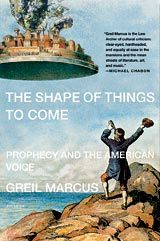Whether speaking about music, politics or film, Greil Marcus always looks to what has come before.

“There may come a time where we’ve used up our past,” Marcus says in a phone interview with Xpress. “The past is a deep lake, and we may drain it dry someday, but I hope we haven’t yet.”
As the first reviews editor for Rolling Stone and the author of numerous books, Marcus helped elevate rock criticism to a new level. Rock ‘n’ roll was no longer just a youth movement, and to Marcus’ keen eye it was a cultural shift on par with The Great Awakening of the 1700s and the civil-rights movement of the 20th century. Marcus helped elevate rock ‘n’ roll to its mythic status, and inadvertently helped create the music snob. (Thanks for that one, Greil.)
But the historian in Marcus wasn’t satisfied by merely elevating Springsteen and Dylan albums to the musical equivalent of the pantheon of the gods. He poked around until he unearthed Harry Smith’s Anthology of American Folk Music, a collection of scratchy folk and blues recordings that laid the very foundation of American music.
Dirty business: Grub‘s centuries-old theme remains relevant
by Alli Marshall
That Elise Blackwell’s novel Grub (Toby Press, 2006) begins and ends at the Blue Ridge Writer’s Conference in the mountains of North Carolina is not really the reason to delve into this page-turner.

Grub is a retelling of George Gissing’s New Grub Street, published in 1891. While Gissing spoofs the publishing world of late-19th-century London, Blackwell’s characters live in 21st-century Manhattan. Details have changed with the times: There are laptops, cell phones and a white lycra cat suit Gissing wouldn’t have dreamed of. However, the cautionary tale is the same.
Grub thrusts three college friends, all writers, into the highly competitive world of agents, book deals and advances. Eddie (the updated version of Gissing’s Edwin) is craft-driven, if not commercially successful. Eddie’s best friend Jackson (Gissing’s Jasper) is driven to “make it” financially. At the book’s opening we’re told he gives himself five years to taste fame. To do this, he produces a gimmicky manuscript which earns him top dollar—as well as Eddie’s scorn. But, as Jackson’s sell-out spells success, Eddie’s career and personal life tailspin.
At one point, following an author’s leap from a burning building, Blackwell writes, “The look on the beautiful firefighter’s face sharpened, and she wrinkled her nose in what even Henry could not mistake for anything other than disgust. ‘You risked your life for an unpublished novel?’”
There is a moral here, and it’s not a comfortable one. Happily, Grub is not the stuff of sermons. Blackwell’s characters are neither wholly redeemable nor despicable, and their adventures are completely captivating. Connivery, affairs, alter egos and the race to become the next big thing: Who knew writing could be such a sexy and harrowing business? @endbullet>X
Elise Blackwell reads from Grub at Malaprop’s on Friday, Sept. 14. 7 p.m. Free. www.malaprops.com or 254-6734.
“It’s almost like the oldest music is the music with the most truth,” says Marcus, who later contributed to the liner notes of a reissue of the anthology.
Within that truth, Marcus began finding threads that weave together the rich tapestry of rock ‘n’ roll. At the same time, the scratchy tremolo-laden sounds of these albums contained the same notions of freedom detailed by the Framers, ideas that still resonate today. The howls and yelps of the bluesmen aren’t just relics of the past, but vital voices of the present, still telling their listeners truths that they may not want to hear.
“I learned something from immersing myself in Harry Smith’s Anthology,” he says. “I think that I picked up some part maybe of his sensibility or his empathy with other voices. Ideally, I am much more of a collagist or a quotationist than a writer.”
With that in mind, Marcus started writing his latest book The Shape of Things To Come: Prophecy and the American Voice (Picador), a book that asks big questions about America’s place in the world and the very idea of America itself. In a time when few politicians are defining what America can and should be, Marcus argues that it’s disparate artists such as David Lynch, Allen Ginsberg and Bill Pullman who are shining light on the country’s potential.
“The point [of the book] is not to make a point,” he says. “I’m trying to create an atmosphere and dramatize certain themes so that when you read the book and go about your daily life and it will be more vivid and more alive with possibility of risk.”
The possibility of risk is one of the larger themes in the book. Tying the idea of America into John Winthrop’s vision of a “city upon a hill,” Marcus attacks the very idea of America as the beacon of the world. Instead, the author sees America’s role as something much more complex and perilous.
“What John Winthrop meant in 1630 by a ‘city on the hill’ was that you were exposed—you can’t hide. If you sin, if you fail, if you violate your covenant, if you betray your promise, everyone will know and there will be no way to hide.”

It’s the corruption of that ideal that Marcus finds dangerous, and just like in The Shape of Things to Come, he shifts effortlessly from 1630 to 1984 to provide an example.
“It’s like Bruce Springsteen with ‘Born in the U.S.A.’ It’s a terribly ironic and sardonic song about the whole corruption of that idea and how it no longer counts for anything. But with that chorus, it turns into a rallying cry. It turns into a kind of mindless patriotic stomp. There’s nothing Springsteen could do about that with the original song except redo it so drastically on stage as this quiet mournful folk song,” Marcus says.
The idea of America, according to Marcus, is like a train in one of those dusty old recordings that’s gone off its tracks.
“We don’t value hard work anymore, and there is this corruption of values.”
But, just like in the refrain of a gospel song, Marcus hints that there is hope coming just around the corner. The source of that hope? Surprisingly, Marcus looks to politics, rather than music.
“Barack Obama has given a number of speeches over the past year where he has contradicted what I’ve said about politicians not speaking about what America is,” Marcus notes. “He’s really edged toward the whole question of what the whole promise of the country is, and what the betrayals of those promises mean, and how we come to grips and face those betrayals and redeem the promise at the same time. He has been talking in those terms, and I believe that were he to be elected as president he would speak in those terms much more fully.”
[Jason Bugg is a freelance writer based in Asheville.]
Greil Marcus reads from his new book, The Shape of Things to Come: Prophecy and the American Voice at Malaprop’s on Saturday, Sept. 15. 7 p.m. Free. Malaprops.com or 254-6734.


Arrghhh! I missed it. Nice piece, Jason.